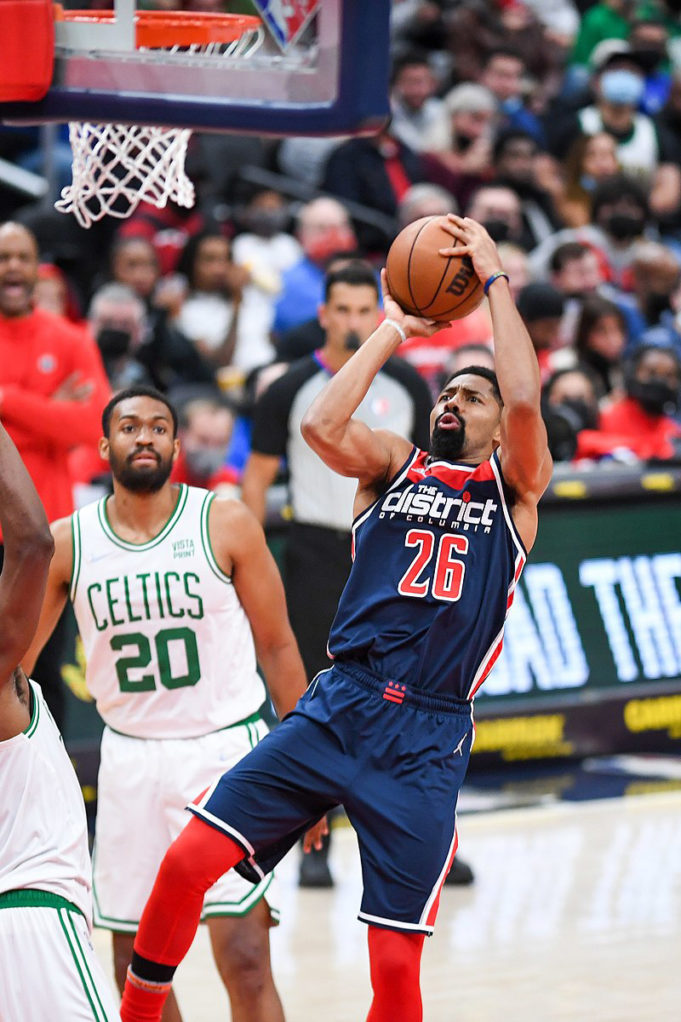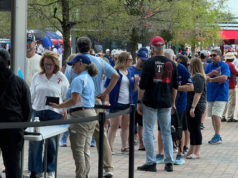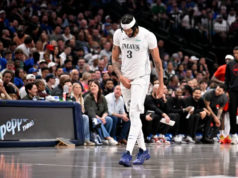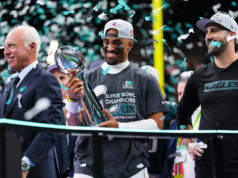Our long(-ish) local sports nightmare is finally over. No, Jerry Jones didn’t drunkenly tumble over the side of his yacht and become shark chow, but the next-worse North Texas sports disaster came to an abrupt end last week.
As the NBA trade deadline drew ever closer to passing without the Mavs making a move, the front office made the most surprising and high-impact trade possible: They shed the contract of oft-injured big man Kristaps Porzingis.
Like many local round-ball geeks, I was filled with a mix of sadness over what could have been and kid-with-a-new-puppy jubilation. More than anything, I’m beyond thrilled that I never have to think, write, or worry about Kris-P ever again.
The return — Washington’s one-trick-three-baller Davis Bertans and point guard/crypto bro Spencer Dinwiddie — for the brittle Latvian was underwhelming. Most in the leering press felt the Wizards’ brass choke-slammed first-year Dallas GM Nico Harrison in this deal, but I feel there’s been a massive over-estimation of KP’s value among the writers — particularly those outside our market.
After two-plus seasons, the Mavs’ brass (correctly) determined The Unicorn wasn’t working here. Despite being smack in the middle of his best statistical season since coming to town, he wasn’t making a difference in terms of wins and losses. He missed 22 out of a possible 57 games (as of this writing), and the team is 13-9 — and 9-3 over the last 12 — with him donning civilian clothes.
His on-court presence was never the issue. With KP, it’s all about that contract. Before we jump into that trench, let me first say that not only do I not blame the Mavs’ braintrust for taking the home run swing that landed Porzingis, but I still applaud them. Back in 2019, the year the head honchos traded a package that included Dennis Smith Jr. and their next 487 first-round picks for the 7-footer, the Mavs were a floundering shit sandwich of a franchise who had just lucked into generational talent Luka Dončić. They saw an opportunity to fast-track the rebuild and rolled the dice. Just like that, people around these parts cared about basketball again.
The trade was a no-brainer. Handing out a max deal to a porcelain doll the following season was a disaster that might have set back the franchise for years.
Porzingis is due to make $33.8 million next season and a staggering $36 million in the 2024-25 season, the final year of his contract. That number, for a player the team doesn’t need to win, makes up roughly one quarter of the total payroll under the salary cap. That’s absurd.
Shedding that toxic contract for two lesser, also terrible deals is a move you have to make if you’re Harrison. Dinwiddie’s three-year, $62 million contract only looks bad because he’s played so terribly this year (more on that later). Just last offseason, he was a highly coveted free agent who was hotly pursued by the Mavs. On the surface, Bertans’ five-year, $80 million deal appears to be a giant fat man sitting on the team’s chest, but only the next couple of seasons are guaranteed unless he reaches certain incentive thresholds.
Should the front office choose to sever ties, neither of those contracts will be as difficult to move as KP’s, though Jason Kidd and the rest of the Dallas coaches will have to rebuild some of the players’ value.
Both Bertans and Dinwiddie have been awful this season, but they have track records of success, and, more importantly, they’ll actually suit up for games.
Dinwiddie is a ball-handler first who can drive to the bucket and draw fouls — something the Mavs need. Aside from Luka, the next best creator/driver the roster offers is Jalen Brunson, who is having a revelatory season. As good as he’s been, he’s not the slasher that Dinwiddie can be.
Dinwiddie’s problem in Washington was that he never touched the ball, and when he did, it was often in late-clock, bail-out possessions. Since Bradly Beal takes an Iverson-esque share of the ball-hog load in D.C., Dinwiddie simply didn’t fit in standing in the corner waiting for a pass that was never coming. No one is happier about this trade than him.
The knock on Dinwiddie is that he’s a ball-stopper — a guy who plays one-on-one and needs a certain volume of touches. When the Dallas offense is humming, they move the ball decisively, so the new point guard seems an odd fit. Here, he’ll likely run the second-team offense, which frequently sputters when Luka is on the pine. Dinwiddie was an effective, sought-after player just six months ago, so it’s not out of the question he was just miscast in Washington. There’s also a better than zero chance he’ll be miscast here, but it seems a reasonable gamble.
Bertans is a three-point sniper who has value only when his shot is falling, and though it hasn’t this season, he boasts a career 40% mark from downtown. He doesn’t do anything else well, except for taking hard fouls, which can be fun to watch. The Mavs are hoping he returns to form from behind the arc, buoyed by the many open looks Luka will supply.
Owner Mark Cuban, Harrison, and company had to pull the trigger on this. With Bertans and Dinwiddie, the front office has a little room to maneuver. Either player could be used as a salary match in a trade, paired with another player/draft capital and pawned off to a rebuilding team, or remember how to play basketball again.
Yes, the Mavs’ ceiling was higher with a healthy and engaged Porzingis. How often was either the case? Now fans in our nation’s capital can worry about his knees, back, and interest level. We are now left only to think about players who actually play.












